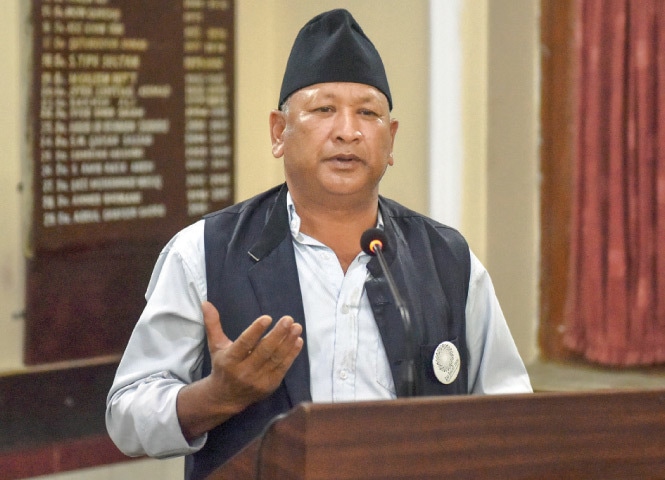
KARACHI: A visiting six-member peace delegation of the Jai Jagat March 2020 that reached Karachi from Kathmandu, Nepal, met members of civil society at the Pakistan Medical Association (PMA) House on Thursday for an exchange of views on peace in the region.
The delegation is in the country for a week. They shared clips and documentaries about the Jai Jagat March, or global march for peace, their yatra as they also referred to it, and its background. It was explained that ‘Jai Jagat’ means ‘planet for all’.
Jagat Bahadur Basnet, the leader of the delegation, provided an overview of their global march. He said they would march till they reached Geneva, Switzerland.
“Our rally for peace, which has already covered 100 days, started in New Delhi and aims to reach the United Nations negotiations for peace in Geneva on Sept 27 where we are looking forward to engaging with thousands more,” he said. “There are economic, social, political and environmental crises that we want solutions for, and we want solutions at the ground level,” he added.
“We are looking for social inclusion and growth, poverty eradication, end to environmental problems, end to health problems, etc. We want to peacefully agree to share resources, too,” he said.
‘There are economic, social, political and environmental crises that we want solutions for’
Formally welcoming the delegation, Dr Tipu Sultan of the PMA said that he had witnessed poverty, ignorance, suffering and injustice from the eyes of a doctor and an activist in all the Saarc nations. “So when you reach Geneva, we will also be there to join you in your talks for the promotion of peace here,” he said.
Peace activist Adam Malik said that the impact of conflict had damaged the life of the common man. “Peace, therefore, is the wish of every person in this region,” he said.
Mahnaz Rahman of the Joint Action Committee said that the Jai Jagat March was part of Gandhi’s vision and his message deserved to be carried forward. “Our new generations don’t know about Gandhi’s teachings. He went on hunger strike to make India give Pakistan its share of assets after Partition. We all should work for peace. Peace is a requisite for Saarc countries,” she said.
Bhavani, a woman member of the delegation, said that women had marched from Nepal all the way here for women who have to tolerate a lot in our society. “Women are also peasants who work very hard but have to see their families go to bed on an empty stomach because they don’t own land. Peasants are facing social and economic exclusion,” she said.
Habibuddin Junaidi of the Peoples Labour Bureau said that there was a need for land reforms to give peasants their rights otherwise the rich were becoming richer and the poor poorer. “The gap between the haves and have-nots is increasing due to neoliberal economic policies,” he said.
Lyam Bahadur Darjee, another Nepalese member of the march, said they needed to understand that peace had strong spiritual people to people linkages. “We are all human beings first and understand each other’s struggles. You all are also with us on this yatra in spirit if not in person,” he said.
Karamat Ali, of the Pakistan Institute of Labour Education and Research, said that it was sad how the governments of Pakistan, India and Bangladesh didn’t see eye to eye even though the people of all these countries would like to meet and sit with one another. He also said that most of the people in these countries were uneducated as their governments had huge defence budgets for which they also took international loans from places such as the IMF or the World Bank. “In doing this these countries have put their coming four generations under debt,” he lamented, while underlining the need to stop the arms race in South Asian countries to end poverty and exclusion in the region.
“For a lasting peace in the South Asia region all the Saarc member countries should sign a pact that no country will fight with any other South Asian country similar to the pact already signed by the ASEAN member countries,” he said.
Published in Dawn, February 21st, 2020













































Dear visitor, the comments section is undergoing an overhaul and will return soon.